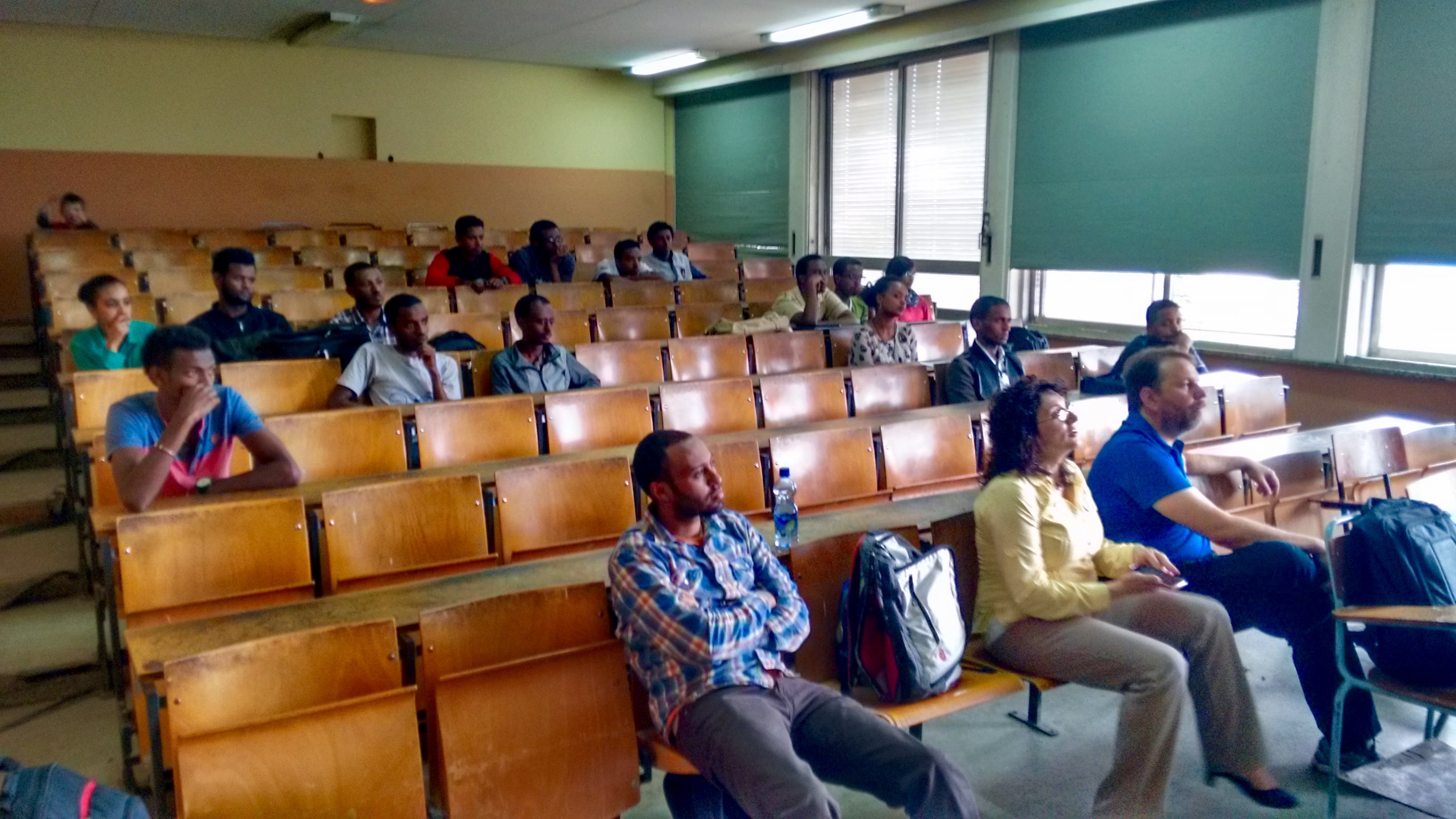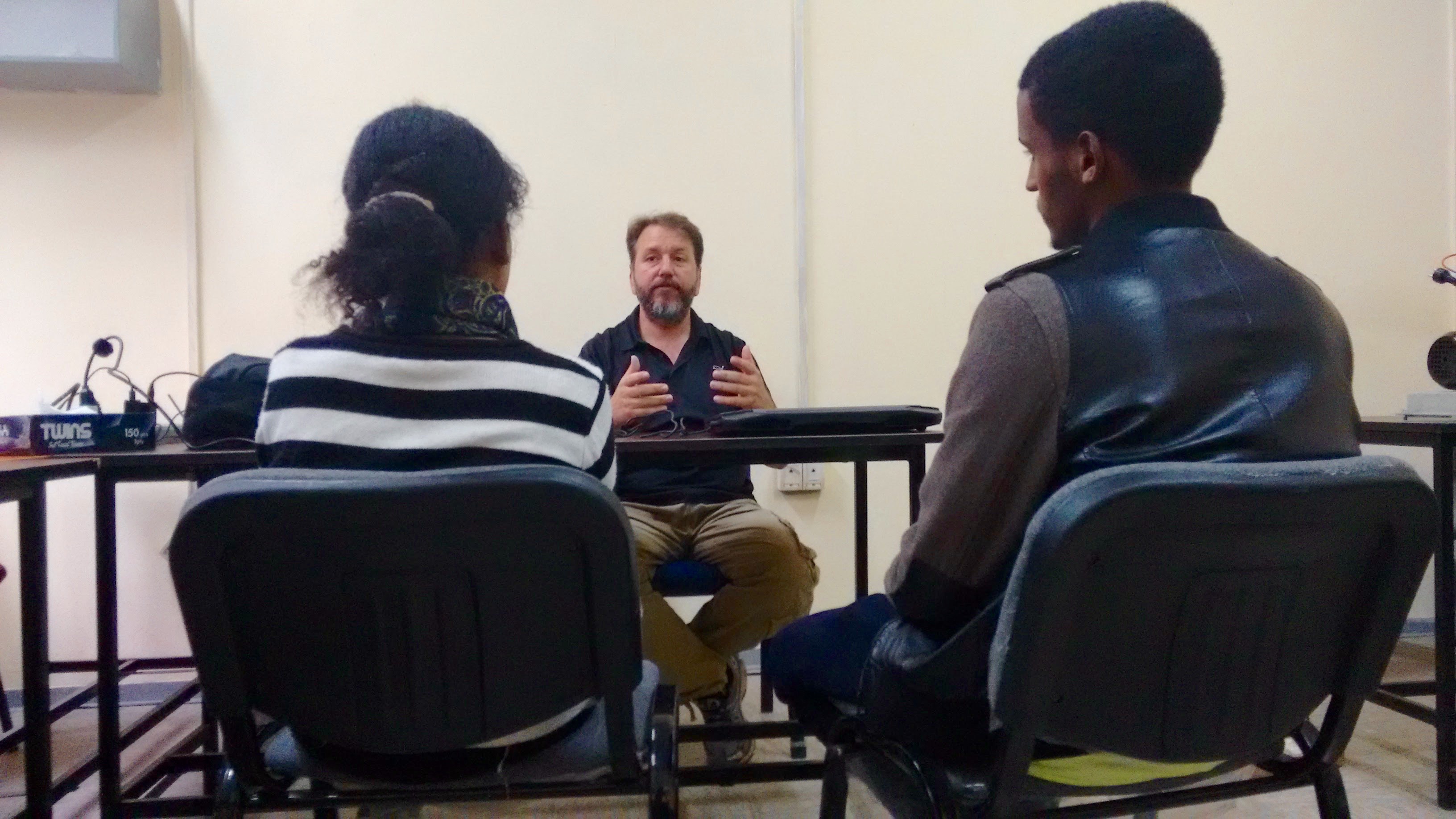Relationship with Ethiopia’s Addis Ababa Institute of Technology Grows with Research Exchange Program
Under a new pilot program, three U-M CSE graduate students traveled to Ethiopia for one month to bootstrap research projects with current AAiT students.

 Enlarge
Enlarge
During a trip to Ethiopia in 2009, Profs. Todd Austin and Valeria Bertacco visited Addis Ababa Institute of Technology to give a talk about Michigan Engineering. Finding great enthusiasm for EECS amongst students there, the pair arranged for the donation of computer equipment for labs and while on sabbatical in 2012 built curriculum and taught. In the years since, Austin and Bertacco have recruited graduate students from AAIT. A broader relationship with Michigan exists now, and in early 2015 Austin and Bertacco were part of a U-M delegation to AAIT that included 10 schools and colleges, which are currently engaged in collaborative projects with colleagues in Ethiopia.
The two now hope to build an even stronger relationship between U-M and AAIT through their research exchange program. During the pilot program, which took place this year, three U-M CSE graduate students, William Arthur, Salessawi Ferede, and Biruk Mammo, traveled to Ethiopia for one month to bootstrap research projects with current AAiT students.

 Enlarge
Enlarge
“The CSE-AAiT Research Exchange Program offers a unique opportunity for UM CSE graduate students to visit Ethiopia and work side-by-side with Ethiopian AAiT students. Michigan CSE students and professors work together to mentor AAiT students into MS and early PhD research projects. Through these experiences, Michigan students develop teaching and mentoring skills, make new friends, and feel like their contributions made a real difference!” explained Prof. Austin.
The six research projects in the pilot program include:
1. Redefining Access Control to Enable Automated Recommendation Inference
Faculty Mentor: Harsha V. Madhyastha
In this project, they are developing a new ecosystem in which add-ons installed on a user’s browser will automatically discover the user’s recommendations.
2. SAD with Sampling in Hardware for 3D Ultrasound
Faculty Mentor: Thomas Wenisch
Sum of Absolute Differences (SAD) is a commonly used algorithm for comparing the similarity between two image sections by summing the absolute differences at each pixel pair. In this project, they are developing a hardware design that can quickly process SAD for various data using a statistical sampling algorithm.
3. Getting in Control of Your Control Flow
Faculty Mentor: Todd Austin
In this project, they are developing a novel approach to ensure the runtime integrity of program control flow, which eliminates the root cause of control-flow attacks by removing all control indirection from software.
4. Smart, Programmable Memory Controllers
Faculty Mentor: Todd Austin
Memory communication delays are the bottlenecks in computer systems. This project focuses on reducing memory delays by moving the computation to the memory unit, where smart accelerated memory controllers are designed and embedded in next-generation 3D memory stacks.
5. Software-Guided Verification of Heterogeneous System Designs
Faculty Mentor: Valeria Bertacco
In this project, they are developing a method to identify, which activities of a design are exercised most frequently in the expected deployment of the hardware/software system, and generate tests that exercise specifically those functionalities.
6. Sniffing out Security Attacks
Faculty Mentors: Valeria Bertacco and Todd Austin
The aim of this project is to design a hardware mechanism that can continuously monitor a system and detect, in real-time, if a malicious program is running on it.
Biruk Mammo and William Arthur both enjoyed their time in Ethiopia. “I very much enjoyed spending part of the summer working at Addis Ababa Institute of Technology in Ethiopia. I was there for 6 weeks, working with students to develop their capstone design projects. I was really impressed by how hard the students worked, and by the great desire they have to pursue education to the fullest” explained Mammo, and the most memorable part for William Arthur was the “wonderful, welcoming people of Addis Ababa.”
Prof. Bertacco believes “the CSE-AAiT research exchange program is a great opportunity to strengthen our college of engineering’s partnership with AAiT and to provide cross-cultural research experiences for our graduate students, preparing them for their future professional career. I hope that in the upcoming years we’ll be able to expand the program to encompass additional engineering programs at UofM and AAiT.”
 MENU
MENU 
